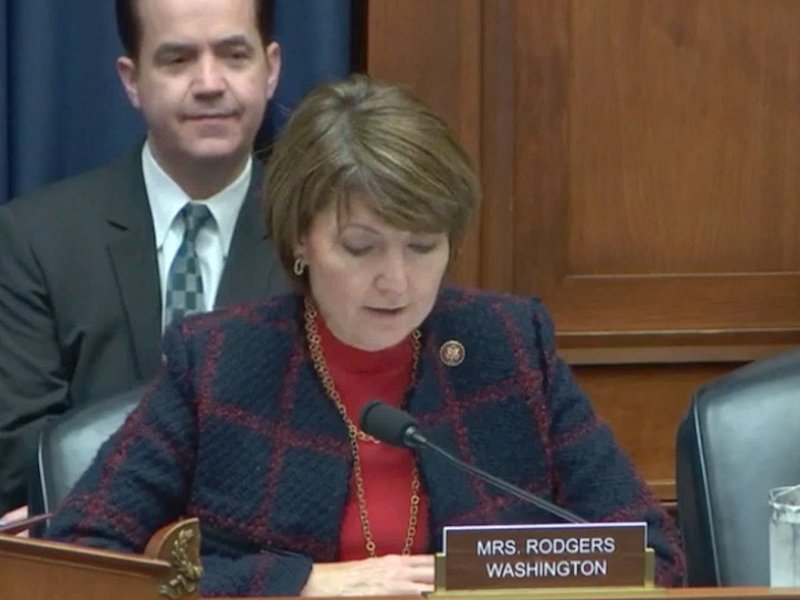
Officials from trade groups representing automakers and tech companies, as well as consumer and vehicle safety, called on Congress to carve out legislation for autonomous vehicles that sharpens safeguards and closes loopholes without hindering innovation and global competitiveness.
During the hearing, held Tuesday in Washington by a House Energy and Commerce subcommittee, witnesses and legislators spoke of the growing benefits of autonomous vehicle technology — and, eventually, self-driving vehicles on their own — and their role in preventing or mitigating accidents and collisions.
But obstacles remain, including the need for federal legislation that allows the United States to remain globally competitive as other countries, including China and Japan, roll out their own regulations and developments for self-driving vehicles.
Rep. Cathy McMorris Rodgers, R-Wash., said the U.S. has fallen behind other countries since the Self Drive Act was approved unanimously by the House in 2017.
“China is using our infrastructure, testing on our roads, collecting information on our citizens and stealing our technology to beat us,” Rodgers said. “There is a global race to AVs. Do we want China to win that race or do we want to lead?”
The Self Drive Act established a federal framework to ensure the safety of AVs and preempts states from enacting laws regarding the design, construction and performance of these vehicles, but Rodgers said additional framework is still needed.
Gary Shapiro, CEO of the Consumer Technology Association, which produces the CES trade show, said those involved in developing AV technology and legislation should be focusing on “safety, empowerment and competitiveness.”
He said the lack of a national goal and an unclear sense of urgency are hindering the country’s progress.
Cathy Chase, president of Advocates for Highway and Auto Safety, argued against the claim that the U.S. is falling behind other countries in advancing the deployment of AVs.
“The U.S. is not behind in other countries in allowing them to go to market, but we are behind in establishing comprehensive safeguards to ensure that this progress happens without jeopardizing or diminishing public safety,” she said.
Chase called for legislation that advances a public safety agenda — not just an economic one — and addresses a broad range of topics on safety, accessible mobility and consumer confidence.
Jeffrey Tumlin, director of transportation for San Francisco’s Municipal Transportation Agency, also called on Congress to require companies to include event data recorders in AVs to preserve information from sensors, and that every safety incident involving a self-driving vehicle be documented in a national public database.
Others, including Mark Riccobono of the National Federation of the Blind, spoke to the positive impact AVs could have for those with disabilities and limited mobility and urged committee members to avoid discriminatory legislation.
“In other words, eyesight must not be a requirement for a license to operate an autonomous vehicle,” Riccobono said in his written testimony.
John Bozzella, CEO of the newly formed Alliance for Automotive Innovation, told the Consumer Protection and Commerce Subcommittee in testimony Tuesday that “successful testing and deployment of AVs rests on a robust federal safety agency, increased public awareness and education, and coordination between federal, state and local government.”
Bozzella recommended establishing a regulatory framework that enables safe testing and deployment of these technologies, and reinforcing and clarifying the roles of federal, state and local authorities. He said any legislation passed by the committee should not be “the final word,” meaning Congress and federal safety authorities should be able to “refine and adjust AV policy in the future.”
“Effectively, the worst outcome would be for Congress to delay the enactment of meaningful legislation that would establish the needed federal framework to realize these safety and mobility solutions,” Bozzella said.
Just last week, the National Highway Traffic Safety Administration gave self-driving vehicle startup Nuro Inc. permission over the next two years to deploy up to 5,000 low-speed delivery vehicles on public roads in Houston. It was a first-ever exemption for an autonomous vehicle by NHTSA.
Daniel Hinkle, senior state affairs counsel for the American Association for Justice, which represents those who may be injured by AVs now and in the future, said in his testimony that any federal legislation should preserve the role of states to ensure safety on the roads, however.
“First, those who are injured or harmed by automated driving must be able to hold the driver manufacturer accountable,” he said.
Rep. Jan Schakowsky, D-Ill., added that Congress “must be very thorough and move with an abundance of caution” in passing AV legislation.
The job before the subcommittee now is to work on legislation that will reduce fatalities and injuries from accidents and collisions, pointing to short-term safety goals that will create a path to fully automated driving, she said.
Committee members, including Rep. Debbie Dingell, D-Mich., said they are working on bipartisan legislation.
“We must, in 2020, get this over the line,” she said.